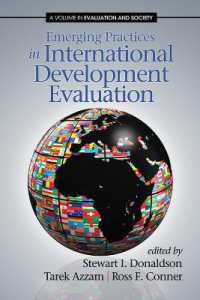- ホーム
- > 洋書
- > 英文書
- > Business / Economics
Full Description
Achieving carbon neutrality is crucial for creating a sustainable and resilient future worldwide. The circular economy framework focuses on reducing waste, optimizing resource use, and promoting regenerative practices, thus curbing carbon footprints. Concurrently, sustainable energy techniques, such as harnessing renewable sources, enhancing energy storage, and boosting energy efficiency, contribute to the reduction of greenhouse gas emissions. With a unique emphasis on net-zero emission approaches, this book delves into circular economy principles and sustainable energy materials, offering a comprehensive perspective on climate change challenges.
Covers fundamental circular economy principles, from carbon capture to advancements in biomass and hydrogen energy
Explores recycling techniques for essential energy materials, including batteries, solar cells, and fuel cells
Provides detailed coverage of technologies, processes, and challenges related to achieving sustainability in the energy sector
Bridges theory and practical applications
Offering a roadmap toward a carbon neutral and net-zero emission future, this book serves as a valuable resource for advanced students, researchers, engineers, and policymakers worldwide seeking solutions to climate change and sustainable development.
Contents
1. Introduction. 2. Principles and Strategies of Circular Economy. 3. Advancements in Carbon Capture Technologies. 4. Mineral Carbonation of Alkaline Industrial Waste and Byproducts for CO2 Sequestration and Utilization. 5. Photo(electro)chemical Systems for Upcycling of Carbon-Containing Waste. 6. Tuning Light-Matter Interaction with Photonic Architectures for CO2 Reduction. 7. Water Chestnut Shell-Derived Carbons as Electrodes for Energy Applications. 8. Unlocking the Potential of Biomass Energy. 9. Challenges and Solutions in Hydrogen Energy. 10. Revolutionizing Energy Sustainability: Unleashing the Potential of rSOC Technology. 11. Application of Clostridium Butyricum to Enhance the in-situ Hydrogen Production and Dechlorination Efficiencies of Chlorinated-Solvent Contaminated Groundwater. 12. Recycling Batteries Materials. 13. Recycling Solar Cell Materials. 14. Recycling Fuel Cell Materials. 15. Concluding Remarks.






